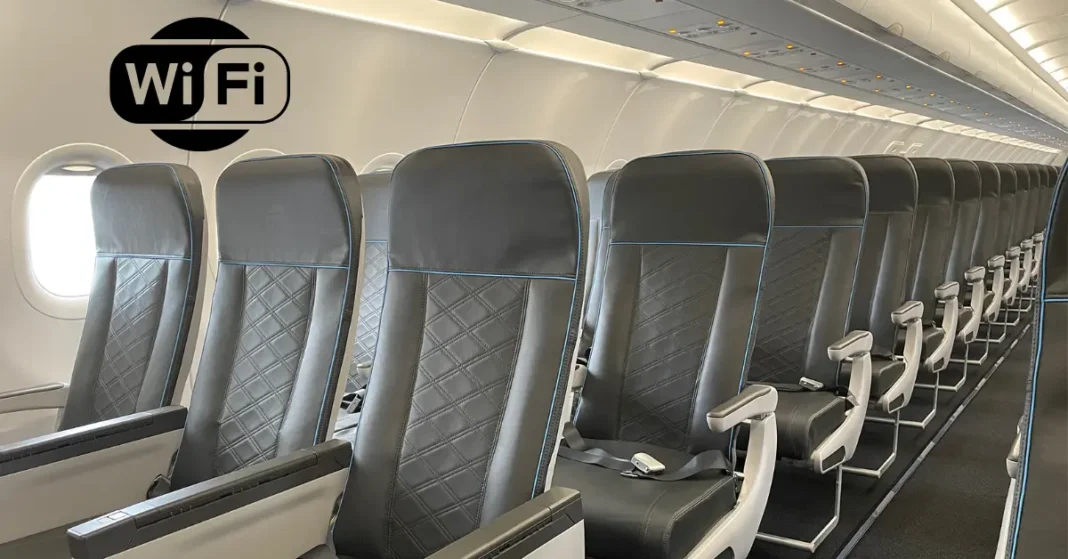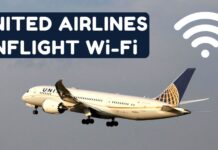In an age where staying connected is the norm, the absence of Wi-Fi on flights can be a deal-breaker for many travelers. Frontier Airlines, one of the prominent carriers in the United States, stands out for not offering Wi-Fi on any of its flights.
This decision places Frontier in the minority, as most airlines have embraced in-flight internet connectivity as a standard offering. Let’s delve into the reasons behind Frontier Airlines’ choice and the implications it has for passengers.
Table of Contents
Factors Influencing Frontier’s Decision
- Cost Considerations:
One primary factor influencing Frontier’s decision to forgo Wi-Fi is the substantial cost associated with installing and maintaining the necessary equipment and infrastructure. The implementation of Wi-Fi on airplanes involves intricate technology, including satellite connectivity and onboard systems, all of which contribute to the overall expense. Frontier Airlines, known for its commitment to providing budget-friendly fares, appears to prioritize cost-effectiveness over in-flight internet services.
- Weight and Fuel Efficiency:
Wi-Fi antennas, crucial components for providing in-flight connectivity, are mounted on the exterior of the aircraft. While seemingly inconspicuous, these antennas add weight to the plane, which, in turn, increases fuel consumption. Frontier’s decision not to incorporate Wi-Fi may be seen as a strategic move to maintain fuel efficiency and reduce operational costs. In an industry where fuel expenses significantly impact the bottom line, every ounce matters.
- Business Model:
Frontier Airlines operates under a business model that emphasizes low base fares with additional charges for optional services. This à la carte approach allows passengers to customize their travel experience by choosing only the services they need. Wi-Fi, in this context, becomes just another service that Frontier has opted not to provide as a default offering. The airline’s focus on cost transparency aligns with its commitment to keeping base fares affordable while allowing passengers to decide which amenities are worth the extra cost.
Advantages of the Wi-Fi Absence
While the absence of in-flight Wi-Fi may be inconvenient for some passengers, it does bring certain advantages:
- Cost Savings for Passengers:
Frontier’s decision not to include Wi-Fi in its standard offerings contributes to the airline’s ability to maintain lower base fares. For budget-conscious travelers, this can be a significant advantage, allowing them to prioritize affordability over in-flight connectivity.
- Reduced Aircraft Wear and Tear:
The absence of Wi-Fi equipment means less wear and tear on the aircraft. With fewer components to maintain and replace, Frontier can potentially extend the lifespan of its fleet, contributing to overall operational efficiency.
- An Opportunity to Disconnect:
In an era where constant connectivity is the norm, the absence of Wi-Fi on Frontier flights provides passengers with a unique opportunity to disconnect from the digital world. Some travelers may appreciate the chance to unwind, read a book, or simply enjoy the journey without the distractions of emails and social media.
Is there free Wi-Fi on Frontier Airlines?
No, Frontier Airlines does not provide complimentary or paid Wi-Fi services on any of its flights. The airline currently does not offer any in-flight internet options. This decision stems from their commitment to offering low fares, as they perceive Wi-Fi as an additional service that could escalate costs and potentially lead to higher ticket prices.
Why does Frontier not offer Wi-Fi?
Frontier Airlines has opted not to provide Wi-Fi on its flights for a variety of reasons, categorized as follows:
Cost: The installation and maintenance of Wi-Fi equipment entail significant expenses. This includes the cost of the required technology and infrastructure, creating a financial burden for the airline. Additionally, Wi-Fi antennas on the aircraft adds weight, leading to increased fuel consumption. Ongoing maintenance and support for Wi-Fi systems further contribute to the overall costs.
Business Model: Frontier Airlines adheres to a business model that prioritizes low-base fares. The airline charges separately for additional services, including Wi-Fi, embracing an “unbundled” approach. This strategy allows passengers to customize their experience by choosing only the necessary services, thus helping keep base fares at an affordable level. Frontier places a significant emphasis on providing value through low fares rather than offering amenities such as in-flight Wi-Fi.
Competition: By abstaining from providing Wi-Fi, Frontier distinguishes itself from other airlines in the market. This strategic decision aims to attract passengers who prioritize cost considerations over in-flight amenities. Frontier recognizes the importance of differentiation in a competitive market and targets an audience that values affordable pricing.
Other Factors: Frontier may perceive limited demand for Wi-Fi on their flights, leading them to question the justification for the substantial costs associated with installation and maintenance. Additionally, the airline’s focus on short-haul flights contributes to the decision, as many of their routes involve relatively brief durations. Given the shorter travel times, some passengers may find the absence of Wi-Fi on these flights to be a negligible factor in their overall travel experience.
Conclusion
Frontier Airlines’ decision not to offer in-flight Wi-Fi is rooted in a combination of cost considerations, fuel efficiency priorities, and a business model centered around providing affordable base fares.
While this choice may not align with the expectations of all passengers, it underscores Frontier’s commitment to delivering budget-friendly travel options. As the aviation industry continues to evolve, the debate over whether Wi-Fi is a necessity or a luxury in the skies remains ongoing. Frontier’s stance adds a unique perspective to the conversation.





